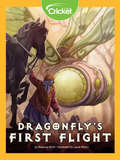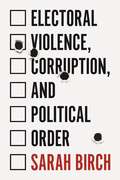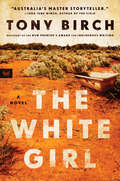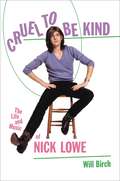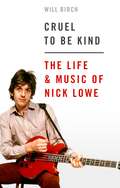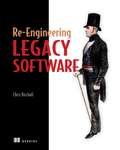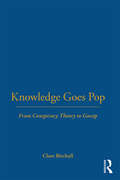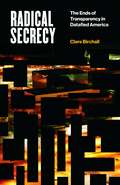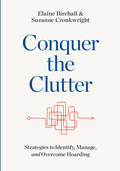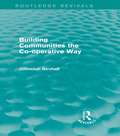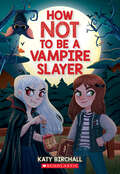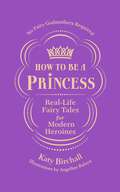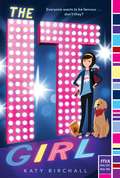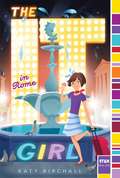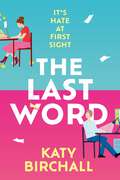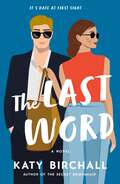- Table View
- List View
Dragonfly’s First Flight
by Rebecca BirchPippa’s mischievous little brother gets them both into hot water when his imagination gets away with him and they end up aboard a flying machine high above London. When the invention falters, she must use her problem-solving skills and think quickly to get them both safely home! What would you do if you were in her shoes?
Oral Caress: A Loving Guide to Exciting a Woman
by Robert W. BirchA guide to performing cunnilingus.
Peripheral Nerve Injuries: A Clinical Guide
by Rolfe BirchPeripheral Nerve Injuries: A Clinical Guide is a fully illustrated and informative reference on injuries within the peripheral nervous system. It incorporates new knowledge in molecular and cellular events which underlie the response of nerves to injury, regeneration and neuropathic pain. Written by a leading expert in the field, Peripheral Nerve Injuries: A Clinical Guide, is a valuable resource for surgeons in residence and training.
Surgical Disorders of the Peripheral Nerves
by Rolfe BirchSince the highly praised first edition of Surgical Disorders of the Peripheral Nerves was published in 1998, greater understanding of the the molecular and cellular events which underlie the response of nerves to injury, regeneration and neuropathic pain has been achieved. This second edition has been fully updated in line with new clinical knowledge, and also incorporates the extensive study of thousands of surgical case studies spanning repairs of the supraclavicular plexus in the adult, the birth lesion of the brachial plexus,compound nerve injury and iatrogenous injury. Beginning with the fundamentals of the anatomy and function of the peripheral nervous system, and working its way through various types of injury, operative methods, the regeneration and recovery of nerves, surgical reconstruction, pain, and rehabilitation, this eloquently written work provides the reader with the solid understanding required to successfully perform surgery on the peripheral nervous system. Dr Shelagh Smith, joined by Dr Ravi Knight, has rewritten the chapter Electrodiagnosis. Professor Tara Renton has written a new chapter on injuries to the trigeminal nerve in maxilla-facial and dental work. The drawings, by Mr Philip Wilson, are new. Most of the 700 illustrations are also new. This thorough and authoritative look at the surgical treatment of the peripheral nerves is fully illustrated throughout with exquisite line diagrams and clear, instructive photographs.
Electoral Violence, Corruption, and Political Order
by Sarah BirchA comprehensive look at how violence has been used to manipulate competitive electoral processes around the world since World War IIThroughout their history, political elections have been threatened by conflict, and the use of force has in the past several decades been an integral part of electoral processes in a significant number of contemporary states. However, the study of elections has yet to produce a comprehensive account of electoral violence. Drawing on cross-national data sets together with fourteen detailed case studies from around the world, Electoral Violence, Corruption, and Political Order offers a global comparative analysis of violent electoral practices since the Second World War.Sarah Birch shows that the way power is structured in society largely explains why elections are at risk of violence in some contexts but not in others. Countries with high levels of corruption and weak democratic institutions are especially vulnerable to disruptions of electoral peace. She examines how corrupt actors use violence to back up other forms of electoral manipulation, including vote buying and ballot stuffing. In addition to investigating why electoral violence takes place, Birch considers what can be done to prevent it in the future, arguing that electoral authority and the quality of electoral governance are more important than the formal design of electoral institutions.Delving into a deeply influential aspect of political malpractice, Electoral Violence, Corruption, and Political Order explores the circumstances in which individuals choose to employ violence as an electoral strategy.
The White Girl: A Novel
by Tony Birch“A profound allegory of good and evil, and a deep exploration of human interaction, black and white, alternately beautiful and tender, cruel and unsettling.”—GuardianAustralia’s leading indigenous storyteller makes his American debut with this immersive and deeply resonant novel, set in the 1960s, that explores the lengths we’ll go to save the people we love—an unforgettable story of one native Australian family and the racist government that threatens to separate them.Odette Brown has lived her entire life on the fringes of Deane, a small Australian country town. Dark secrets simmer beneath the surface of Deane—secrets that could explain why Odette's daughter, Lila, left her one-year-old daughter, Sissy, and never came back, or why Sissy has white skin when her family is Aboriginal. For thirteen years, Odette has quietly raised her granddaughter without drawing notice from welfare authorities who remove fair-skinned Aboriginal children from their families. But the arrival of a new policeman with cruel eyes and a rigid by-the-book attitude throws the Brown women's lives off-kilter. It will take all of Odette's courage and cunning to save Sissy from the authorities, and maybe even lead her to find her daughter. Bolstered by love, smarts, and the strength of their ancestors, Odette and Sissy are an indomitable force, handling threats to their family and their own identities with grace and ingenuity, while never losing hope for themselves and their future.In The White Girl, Miles Franklin Award-nominated author Tony Birch illuminates Australia’s devastating post-colonial past—notably the government’s racist policy of separating Indigenous children from their families, known today as the Stolen Generations—and introduces a tight-knit group of charming, inspiring characters who remind us of our shared humanity, and that kindness, hope, and love have no limits.
The Commentaries of the Great Afonso Dalboquerque: Volume II
by Walter De BirchThis is translated from Part ii of the Portuguese Edition of 1774, with Notes and an Introduction. Continues from First Series 53, and continued in 62, and 69. This is a new print-on-demand hardback edition of the volume first published in 1877.
The Commentaries of the Great Afonso Dalboquerque, Second Viceroy of India: Volumes I-IV (Cambridge Library Collection - Hakluyt First Ser.)
by WalterdeGray BirchVolume I: This is translated from the Portuguese Edition of 1774, with Notes and an Introduction. Volume II: This is translated from Part ii of the Portuguese Edition of 1774, with Notes and an Introduction. Volume III: Part iii of the 1774 edition. With descriptions of Malacca and Goa translated from Pedro Barretto de Resende's Livro do Estado da India Oriental. The supplementary material consists of the 1880 annual report. Volume IV: Part iv of the 1774 edition. With Portuguese descriptions of places and fortresses in Portuguese India, and a pedigree of Albuquerque from British Library MSS. With an index to all four volumes. This is a new print-on-demand hardback edition of the volumes first published in 1875,1877, 1880 and 1884.
Cruel to Be Kind: The Life and Music of Nick Lowe
by Will BirchThe definitive biography of singer-songwriter Nick Lowe, best-known for "Cruel to Be Kind" and "(What's So Funny 'Bout) Peace, Love, and Understanding" Described as "Britain's greatest living songwriter," Nick Lowe has made his mark as a pioneer of pub rock, power-pop, and punk rock and as a producer of Elvis Costello, Graham Parker, the Damned, and the Pretenders. He has been a pop star with his bands Brinsley Schwarz and Rockpile, a stepson-in-law to Johnny Cash and June Carter Cash, and is the writer behind hits including "Cruel to Be Kind" and "(What's So Funny 'Bout) Peace, Love, and Understanding." In the past decades, however, he has distinguished himself as an artist who is equally acclaimed for the second act of his career as a tender yet sharp-tongued acoustic balladeer. Biographer Will Birch, who in addition to being a music writer was a drummer and songwriter with The Records, has known Lowe for over forty years and melds Lowe's gift as a witty raconteur with his own authoritative analysis of Lowe's background and the cultural scenes he exemplifies. Lowe's parallel fame as one of the best interviews in the business will contribute to this first look into his life and work--and likely the closest thing fans will get to an autobiography by this notoriously charming cult figure.This is not an authorized biography, but Lowe has given it his spiritual blessing and his management and label are fully on board. Cruel to Be Kind will be the colorful yet serious account of one of the world's most talented and admired musicians.
Cruel To Be Kind: The Life and Music of Nick Lowe
by Will Birch'Brilliant biography of an undersung late-blooming treasure . . . subtly profound as well as wickedly entertaining, this biography does its subject scintillating justice' MojoCruel to Be Kind is the definitive account of Nick Lowe's uncompromising life as a songwriter and entertainer, from his days at Stiff Records, to becoming the driving force behind Rockpile, to the 1979 smash hit 'Cruel To Be Kind'.Nick's original compositions have been recorded by the best in the business, from enfant terrible of the New-Wave, Elvis Costello, to 'The Godfather of Rhythm and Soul', Solomon Burke; from household names, including Engelbert Humperdink, Diana Ross, and Johnny Cash, to legendary vocalists such as Curtis Stigers, Tom Petty, and Rod Stewart.His reputation as one of the most influential musicians to emerge from that most formative period for pop and rock music is cast in stone. He will forever be the man they call the 'Jesus of Cool'.'Nick's poise as a singer, his maturity, and his use of tone is beautiful. I can't believe it's this guy I've been watching since I was a teenager' Elvis Costello, 2013'The master of subversive pop' Nick Kent, NME, 1977'Nick Lowe is such a f*cking good songwriter! Am I allowed to say that?' Curtis Stigers, 2016
Re-Engineering Legacy Software
by Chris BirchallSummaryAs a developer, you may inherit projects built on existing codebases with design patterns, usage assumptions, infrastructure, and tooling from another time and another team. Fortunately, there are ways to breathe new life into legacy projects so you can maintain, improve, and scale them without fighting their limitations.Purchase of the print book includes a free eBook in PDF, Kindle, and ePub formats from Manning Publications.About the BookRe-Engineering Legacy Software is an experience-driven guide to revitalizing inherited projects. It covers refactoring, quality metrics, toolchain and workflow, continuous integration, infrastructure automation, and organizational culture. You'll learn techniques for introducing dependency injection for code modularity, quantitatively measuring quality, and automating infrastructure. You'll also develop practical processes for deciding whether to rewrite or refactor, organizing teams, and convincing management that quality matters. Core topics include deciphering and modularizing awkward code structures, integrating and automating tests, replacing outdated build systems, and using tools like Vagrant and Ansible for infrastructure automation. What's InsideRefactoring legacy codebasesContinuous inspection and integrationAutomating legacy infrastructureNew tests for old codeModularizing monolithic projectsAbout the ReaderThis book is written for developers and team leads comfortable with an OO language like Java or C#.About the AuthorChris Birchall is a senior developer at the Guardian in London, working on the back-end services that power the website.Table of ContentsPART 1 GETTING STARTEDUnderstanding the challenges of legacy projects Finding your starting pointPART 2 REFACTORING TO IMPROVE THE CODEBASEPreparing to refactorRefactoringRe-architectingThe Big RewritePART 3 BEYOND REFACTORING—IMPROVING PROJECT WORKFLOWAND INFRASTRUCTUREAutomating the development environmentExtending automation to test, staging, and production environmentsModernizing the development, building, and deployment of legacy softwareStop writing legacy code!
Knowledge Goes Pop: From Conspiracy Theory to Gossip (Culture Machine)
by Clare BirchallA voice on late night radio tells you that a fast food joint injects its food with drugs that make men impotent. A colleague asks if you think the FBI was in on 9/11. An alien abductee on the Internet claims extra-terrestrials have planted a microchip in her left buttock. 'Julia Roberts in Porn Scandal' shouts the front page of a gossip mag. A spiritual healer claims he can cure chronic fatigue syndrome with the energizing power of crystals . . . What do you believe? Knowledge Goes Pop examines the popular knowledges that saturate our everyday experience. We make this information and then it shapes the way we see the world. How valid is it when compared to official knowledge and why does such (mis)information cause so much institutional anxiety? Knowledge Goes Pop examines the range of knowledge, from conspiracy theory to plain gossip, and its role and impact in our culture.
Radical Secrecy: The Ends of Transparency in Datafied America (Electronic Mediations #60)
by Clare BirchallReimagining transparency and secrecy in the era of digital data When total data surveillance delimits agency and revelations of political wrongdoing fail to have consequences, is transparency the social panacea liberal democracies purport it to be? This book sets forth the provocative argument that progressive social goals would be better served by a radical form of secrecy, at least while state and corporate forces hold an asymmetrical advantage over the less powerful in data control. Clare Birchall asks: How might transparency actually serve agendas that are far from transparent? Can we imagine a secrecy that could act in the service of, rather than against, a progressive politics? To move beyond atomizing calls for privacy and to interrupt the perennial tension between state security and the public&’s right to know, Birchall adapts Édouard Glissant&’s thinking to propose a digital &“right to opacity.&” As a crucial element of radical secrecy, she argues, this would eventually give rise to a &“postsecret&” society, offering an understanding and experience of the political that is free from the false choice between secrecy and transparency. She grounds her arresting story in case studies including the varied presidential styles of George W. Bush, Barack Obama, and Donald Trump; the Snowden revelations; conspiracy theories espoused or endorsed by Trump; WikiLeaks and guerrilla transparency; and the opening of the state through data portals.Postsecrecy is the necessary condition for imagining, finally, an alternative vision of &“the good,&” of equality, as neither shaped by neoliberal incarnations of transparency nor undermined by secret state surveillance. Not least, postsecrecy reimagines collective resistance in the era of digital data.
Conspiracy Theories in the Time of Covid-19 (Conspiracy Theories)
by Clare Birchall Peter KnightConspiracy Theories in the Time of Covid-19 provides a wide-ranging analysis of the emergence and development of conspiracy theories during the Covid-19 pandemic, with a focus on the US and the UK. The book combines digital methods analysis of large datasets assembled from social media with politically and culturally contextualised close readings informed by cultural studies. In contrast to other studies which often have an alarmist take on the "infodemic," it places Covid-19 conspiracy theories in a longer historical perspective. It also argues against the tendency to view conspiracy theories as merely evidence of a fringe or pathological way of thinking. Instead, the starting assumption is that conspiracy theories, including Covid-19 conspiracy theories, often reflect genuine and legitimate concerns, even if their factual claims are wide of the mark. The authors examine the nature and origins of the conspiracy theories that have emerged; the identity and rationale of those drawn to Covid-19 conspiracism; how these conspiracy theories fit within the wider political, economic and technological landscape of the online information environment; and proposed interventions from social media platforms and regulatory agencies. This book will appeal to anyone interested in conspiracy theories, misinformation, culture wars, social media, and contemporary society.
Conquer the Clutter: Strategies to Identify, Manage, and Overcome Hoarding
by Elaine Birchall Suzanne CronkwrightHow to take back your life when your things are taking over.Why does Cliff, a successful lawyer who regularly wins landmark cases, step over two-foot piles of paper whenever he opens his front door? Why do Joan and Paul ask Children's Services to take their three children instead of decluttering their home? Why does Lucinda feel intense pressure to hold onto her family's heirlooms even though she has no room for them? They have hoarding disorder, which an estimated 2% to 6% of the adult population worldwide experience.Conquer the Clutter offers hope to anyone affected by hoarding. Real-life vignettes, combined with easy-to-use assessment and intervention tools, support those who hoard—and those who care about them. Written by Elaine Birchall, a social worker dedicated to helping people declutter and achieve long-term control over their belongings, the book• provides an overview of hoarding, defining what it is—and is not• explains the difference between clutter and hoarding • describes different types of hoarding in detail, including impulse shopping, "closet" hoarding, and animal hoarding• debunks myths about hoarding and hoarders • explores the effects that hoarding has on relationships, on work, and on physical and financial health• presents a practical, step-by-step plan of action for decluttering• contains dedicated advice from individuals who have successfully overcome their hoarding disorderThe most comprehensive work about hoarding on the market, Conquer the Clutter discusses special populations who are not often singled out, such as the disabled and the elderly, and includes numerous worksheets to assist individuals in determining the scope of their hoarding disorder and tackling the problem. Over 40 pages of additional resources are available online at jhupbooks.press.jhu.edu/title/conquer-clutter.
Building Communities: The Co-operative Way (Routledge Revivals)
by Johnston BirchallBuilding Communities: The Co-Operative Way, first published in 1988, sets the flourishing of housing co-operatives throughout the 1980s in a theoretical and historical framework that suggests that tenant control is the best way out of the still-problematic issue of housing policy. Before the First World War, co-operative housing was poised to become a potent force in government policy, but instead municipal housing rose to prominence. However, alongside a growing crisis of confidence in state housing and a continued decline in the private rented sector, a new political consensus has emerged that has placed co-ops firmly at the top of the agenda. Setting out the argument for collective dweller-control of housing, Birchall demonstrates that the arguments for co-operatives are strong, based on a broad spectrum of political thought. He charts the early and recent history of co-operative housing, and shows how they provide a flexible and stable means of meeting housing needs.
Housing Policy in the 1990s
by Johnston BirchallHousing Policy in the 1990s explores the deluge of Conservative legislation of the late 1980s and examines what its effects will be during this decade and into the next century. The contributors discuss and clarify the main aims of the government re-structuring of social strategy and assess its effects on British housing.
The New Mutualism in Public Policy (Routledge Studies in Business Organizations and Networks #No.15)
by Johnston BirchallMutuality has become a topic of debate recently for a whole range of academics and social commentators. The 'demutualisation' of banks and building societies has been partnered by the idea of a 'new mutualism' , forming a set of social values and beliefs, and this collection looks at the manifestations of these trends and the implications for the future.
People-Centred Businesses
by Johnston BirchallSo what is a member-owned business? What does it look like? How can we distinguish it from an investor-owned business? The crucial distinction is between a business that is people-centred, and one that is money-centred. This book explores the growing number of companies which use this model and their wider significance in society.
How Not to be a Vampire Slayer
by Katy BirchallBuffy the Vampire Slayer meets The Witchlings in a hilarious, heartfelt story about a reluctant vampire slayer... and her vampire best friend.Maggie Helsby isn't afraid of much. But one thing that terrifies her is trying to fit in.When she moves to the small town of Goreway, she's eager to shed her old reputation as the weird horror nerd who scares the other kids at school. This time it'll be different. The only problem is that she's moved into a spooky house at the edge of Skeleton Woods, gifted to her parents by a mysterious great uncle she never knew. She can't resist exploring it before the townspeople tear down the forest and build a golf course, even if her new friends are too scared to follow her...What she finds is Skeleton Lodge, the headquarters of a secret coven of vampires, their evil leader Count Bloodthirst, and a young vampire named Sharptooth Shadow who SWEARS she's a vegetarian. She might just be the friend Maggie's been dying to meet! But when Maggie discovers that she descends from a long line of vampire slayers, can she and Sharptooth overcome their history and save the forest and their friendship?
How to be a Princess: Real-Life Fairy Tales for Modern Heroines – No Fairy Godmothers Required
by Katy BirchallAs Meghan Markle once said: 'With fame comes opportunity, but it also includes responsibility - to advocate and share, to focus less on the glass slipper and more on pushing through glass ceilings. And, if I'm lucky enough, to inspire.'Inspired by the Royal Wedding on 19 May, this beautiful collection of light-hearted stories celebrates what it takes to be a modern princess. Smart, strong, kind and brave, every princess here - whether they be fictional or real - is awesome.Including: Meghan, Ameera, Elizabeth II, Elsa, Leia, Moana, Tiana, Fiona, Haya, Lalla, Akishino, Maha, Diana, Catherine, Grace, Maxima, Rania AND princesses ahead of their time: Margaret, Elizabeth I, Pingyang, Hatshepsut, Nzinga and Seondeok.This book will make you smile and inspire you to make your own happy ending.
The It Girl
by Katy BirchallIn this hilarious debut novel, painfully shy Anna is thrust into the spotlight--and onto the cover of every tabloid--when her father marries one of the world's most famous actresses.Everyone wants to be famous...don't they? Anna Huntley had very simple goals in life: 1. To recreate famous film scenes with Dog (her pet Labrador) such as the lift from The Lion King during that "Circle of Life" song. 2. To not accidentally set Queen Bee Josie Graham's hair on fire (again). 3. To keep her very first and only two school friends by not acting in her usual manner of socially inept dork and outcast. 4. And to find out whether points 1 and 2 constitute being socially inept or outcastish. But after her dad gets engaged to one of the most famous actresses ever and she unexpectedly becomes famous, she has to add a new goal to her list: 5. To find a closet to hide in with Dog (preferably for life). With the paparazzi moving in and the cool crowd being friendly for the first time ever, Anna must figure out who her real friends are--before her awkwardness is exposed to the whole world.
The It Girl in Rome (The It Girl #3)
by Katy BirchallAnna finds herself on a class trip to Rome in this hilarious final novel in The It Girl trilogy.Anna Huntley, her friends, and her ACTUAL boyfriend (definitely requires shouting) Connor are going on a class trip to Rome! This is the ideal opportunity for Anna not only to escape the craziness of her dad’s wedding to his world-famous actress fiancée, but also to have a real romantic date with Connor. Nothing could spoil this perfect, pasta-filled chance at love—could it?
The Last Word: the hilarious new enemies to lovers rom-com for fans of BOOK LOVERS
by Katy BirchallA new laugh-out-loud romantic comedy from Katy Birchall, author of The Secret Bridesmaid and The Wedding SeasonHarper Jenkins has a way with words. As Celebrity Editor at a glossy magazine, she knows exactly how to get tight-lipped Hollywood stars talking, landing her exclusive stories and a great reputation.There's only one person who leaves her speechless - her arrogant colleague Ryan, who has been hired as the new Features Editor. Harper remembers Ryan from a decade ago, when they both interned together. Back then she had believed he was someone she could trust - but he betrayed her completely and they've never spoken since.Thrown together again in a busy newsroom, Harper and Ryan clash on everything - he can't bear how chaotic and messy she is while she declares him uptight and infuriating. But as the tension between them builds, who will get to have the last word?PRAISE FOR KATY BIRCHALL: 'Sparkling'Lindsey Kelk 'Perfect feel-good escapism'Laura Jane Williams
The Last Word: A Novel
by Katy Birchall"Birchall's effervescent novel combines an engaging enemies-to-lovers story line with a vibrant London setting." ––Shelf AwarenessA young journalist puts her career––and her heart––on the line when her former work nemesis is hired in her newsroom, for fans of The Hating Game and Beach Read.Harper Jenkins is at the top of her game. A brilliant, determined journalist with a well-known knack for getting tight-lipped Hollywood stars to open up to her, Harper loves her job as Celebrity Editor at a newspaper’s glossy weekend magazine and has the best contacts in the business.But when her awful boss hires talented reporter Ryan to be the new Features Editor, Harper is furious. Because the two have met before: a decade ago, they were interns at the same publication, where they fell into a whirlwind romance…until Ryan betrayed Harper, and they never spoke again.Thrown together in a busy newsroom, their dynamic is a disaster from the start. They can’t agree on anything and bicker constantly—Ryan can’t bear how chaotic and messy Harper is; Harper finds Ryan’s condescending nature infuriating. They clash over who’s writing what article, and fight over who’s going to which event.Yet as they’re forced to spend more and more time together, Harper realizes she may have misjudged Ryan and can’t help but feel a spark growing between them. Long buried feelings start to resurface and, when they’re thrown together on a romantic press trip abroad, their chemistry comes to a head.But all is fair in love and magazines, and with the news that layoffs across the department are imminent, Harper is left to wonder: who will get the last word?
